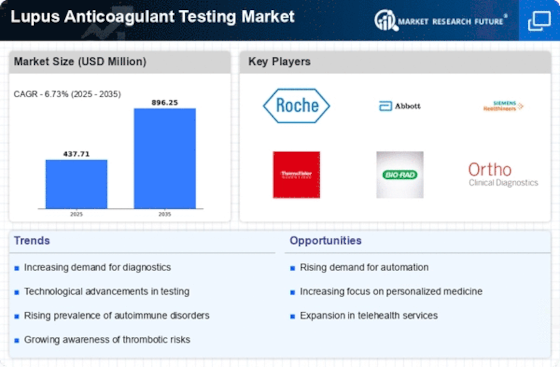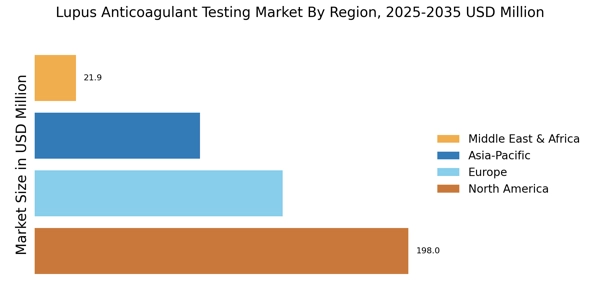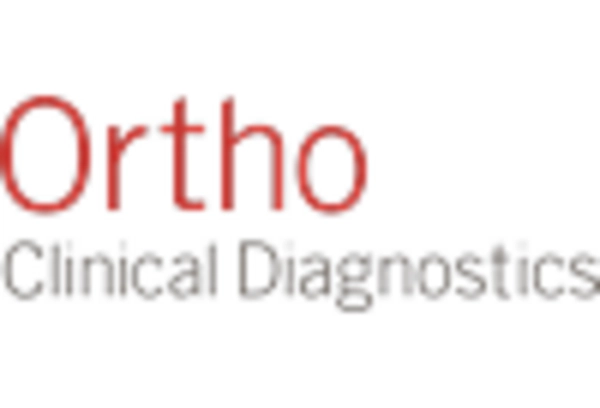Advancements in Diagnostic Technologies
Technological innovations in diagnostic testing are significantly influencing the Lupus Anticoagulant Testing Market. The introduction of more sensitive and specific assays, such as enzyme-linked immunosorbent assays (ELISA) and multiplex testing platforms, enhances the accuracy of lupus anticoagulant detection. These advancements not only improve patient outcomes but also streamline laboratory workflows, making testing more efficient. Market data suggests that the adoption of these advanced technologies is expected to grow at a compound annual growth rate (CAGR) of over 8% in the coming years. As laboratories increasingly invest in cutting-edge diagnostic tools, the demand for lupus anticoagulant testing is likely to see a corresponding increase.
Growing Awareness of Autoimmune Disorders
The heightened awareness surrounding autoimmune disorders, particularly lupus, is a critical driver for the Lupus Anticoagulant Testing Market. Educational campaigns and advocacy efforts have led to increased recognition of lupus and its associated complications, including the role of lupus anticoagulant. This awareness is crucial, as it encourages individuals to seek medical advice and testing. Recent surveys indicate that nearly 70% of patients with lupus are unaware of the potential risks associated with lupus anticoagulant. As awareness grows, so does the demand for testing services, which is expected to rise significantly, thereby contributing to market expansion.
Regulatory Support for Diagnostic Testing
Regulatory bodies are increasingly supporting the development and approval of diagnostic tests for autoimmune conditions, including lupus. This regulatory backing is a vital driver for the Lupus Anticoagulant Testing Market. Streamlined approval processes and guidelines for testing methodologies encourage manufacturers to innovate and bring new products to market. For instance, recent initiatives by health authorities to expedite the review of diagnostic tests have resulted in a surge of new testing options becoming available. This regulatory environment not only fosters competition but also enhances the overall quality of testing, which is likely to boost market growth in the coming years.
Rising Incidence of Antiphospholipid Syndrome
The increasing prevalence of antiphospholipid syndrome (APS) is a notable driver for the Lupus Anticoagulant Testing Market. APS is often associated with lupus and can lead to severe complications such as thrombosis and pregnancy-related issues. Recent studies indicate that the incidence of APS is on the rise, with estimates suggesting that it affects approximately 5-10% of patients with systemic lupus erythematosus. This growing patient population necessitates enhanced testing capabilities, thereby propelling demand for lupus anticoagulant testing. As healthcare providers become more aware of the implications of APS, the need for accurate and timely testing becomes paramount, further stimulating market growth.
Increase in Research Funding for Autoimmune Diseases
The rise in research funding dedicated to autoimmune diseases is a significant driver for the Lupus Anticoagulant Testing Market. Increased investment from both public and private sectors aims to better understand lupus and its associated complications, including the role of lupus anticoagulant. Recent data indicates that funding for autoimmune research has increased by approximately 15% over the past few years. This influx of resources facilitates the development of novel testing methods and enhances the overall understanding of lupus pathophysiology. As research progresses, it is anticipated that new insights will lead to improved testing protocols, thereby driving demand in the lupus anticoagulant testing market.

















